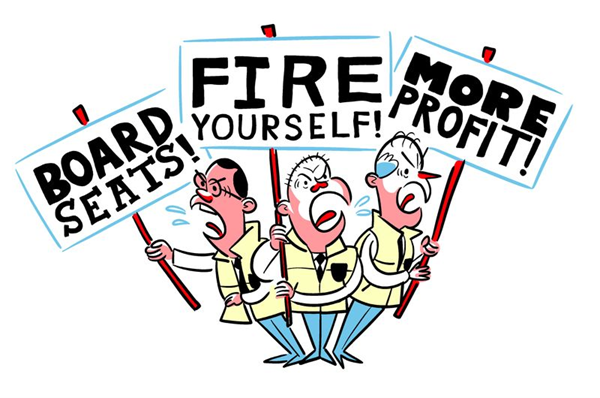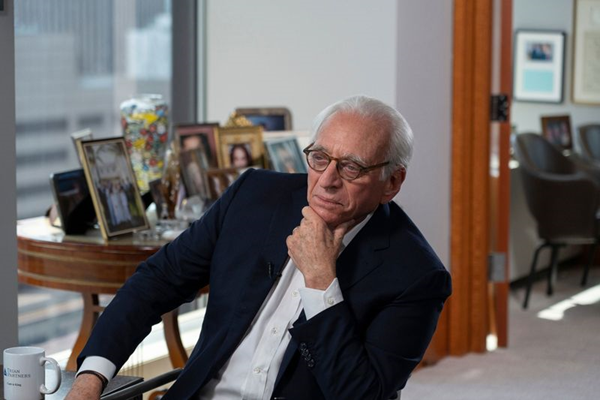Bloomberg
|
Businessweek
Remarks
|
Activists Return to Big Attacks With $400 Billion Chase List
Agitators such as Nelson Peltz and Elliott Management are going after
noteworthy names now that stock prices are down.
|
|

Illustration: Michael Kennedy for Bloomberg
Businessweek |
By
Ed Hammond
February 7, 2023 at 6:00
AM EST
At the start of January, Nelson Peltz returned from doing whatever billionaires
do over the holidays and told Walt
Disney Co. it stunk. That’s not verbatim. But when someone says you
have “prominent cracks in the flywheel,” what else can it mean?
Activist hedge funds make their money by seeking out just such cracks. Their
playbook, of which Peltz is a famed exponent, says that companies (read: share
prices) can be improved (read: share prices can go higher.)
The whole process—storied corporations being picked apart by belligerent,
publicity-hungry rich guys—can be the stuff of high drama, yet for the past few
years it hasn’t been. The stock market was rising so high that activists
struggled to find juicy targets among big names. Instead they went after
smaller, weaker, more boring companies.
|

Peltz Photographer: Calla Kessler/Bloomberg |
Barely a month into 2023, things look quite different. Hours after Peltz threw
shade at Disney, Bayer
AG, the German conglomerate behind everything from aspirin to
weedkiller, found
itself under attack from Jeff Ubben, the
activist-turned-constructivist-turned-occasional-dissident- shareholder.
A few days later, Elliott Management Corp. announced
that it held a stake in tech giant Salesforce
Inc. (Ubben showed
up there, too.) By the end of that week a third investor, ValueAct
Capital, had entered the fray and, in addition to disclosing a stake,
achieved something the others had not: winning a seat on Salesforce’s board for
Mason Morfit, its chief executive officer. Together, Disney, Bayer and
Salesforce have market valuations totaling more than $400 billion, and broad
brand recognition that’s guaranteed to grab headlines.
Big activism is back. Why? Rule changes and a fatigue with bad corporate
governance play important roles, but as with so many things, it starts with
money and good timing.
In the decade-plus leading up to the Covid-19 pandemic, activism went from a
fringe investment strategy to mainstream corporate blood sport. That
transformation—fueled by successful campaigns against big companies such as Procter
& Gamble (Peltz), Canadian
Pacific Railway ( Bill Ackman) and AT&T
Inc. (Elliott)—attracted a lot of money.
Activist hedge funds swaggered into 2020 flush and ready to pounce. Then Covid
happened. During a humanitarian crisis, it seems less cool to pressure companies
to do things such as lay off workers or raise prices for roller-coaster rides.
Activists seemed to understand that a more delicate approach was needed. They
slowed down. Some even swore off activism altogether. Others focused on the
smaller companies they could attack without drawing negative attention from the
press and politicians.
So once the world settled into a new-Covid-normal, with activists still sitting
on oodles of money, it followed that big activism would come back. Why didn’t it
happen sooner? Well, coming out of the crisis, many of the world’s largest
companies were as valuable as they’d ever been or near it, which made it harder
for dissidents to complain about their shortcomings.
Those days are over.
Big Tech and Big Pharma—and pretty much all large corporations, except for Big
Oil—have lost value over the past year. It’s now less expensive for activists to
amass meaningful stakes pretty quickly, and their fellow investors are more
likely to listen to new ideas about getting the stock price back up. And,
according to the activists, there’s been a lot of questionable corporate
governance going on while they were taking a break.
Salesforce is a good example. Seeking corporate strategy improvements, the
world’s largest customer relationship management software company has included
actor Matthew McConaughey and self-proclaimed “thought donor” and rapper Will.i.am in
high-level business meetings, according to the Financial
Times. In September, its co-CEOs took to the stage at the company’s
Dreamforce conference, a yearly celebration of “the magic, the moments, the
miracle of human connection,” wearing fluffy bunny ears.
These are the sort of things that investors might write off as zany or even
visionary in a bull market, but can seem jarring when, three months later, you
say you’re going to sack some 8,000
workers amid slowing sales growth. Similarly, when Peltz showed up at
Disney with a $900 million stake and his eyes trained on a board seat, he
portrayed the company as cartoonishly incompetent. In three short years, Disney
had hired a new CEO, Bob Chapek; embroiled itself in a political row around
LGBTQ+ rights; fired
Chapek; rehired his predecessor, Bob Iger; missed earnings forecasts;
and cut revenue guidance.
The company, Peltz said, was at a crossroads. It could carry on down the dark
path of destroying value or let him Restore
the Magic. (Yes, that’s the actual domain name he’s using to keep
observers up to date on his campaign.) Disney has rejected Peltz’s critique,
claiming his board experience at soap and ketchup companies doesn’t translate to
the entertainment industry.
Activists like going after big companies in part because their sheer size means
there’s more to aim at. Salesforce is a potential piñata. Elliott can use its
stick to encourage job cuts, price increases, asset sales, share buybacks,
executive pay freezes and cheaper cushions on the corporate jets. The
possibilities are endless. And each one, in theory, makes the company—and
Elliott’s investment—more valuable.
Big companies also give activists a degree of risk protection that scale
provides. Peltz, who has wizardly vibes with his white hair and glasses, might
honestly believe that the only way to make Disney’s board the happiest place on
Earth is to give him a seat. No doubt he also knows that, flawed as the company
may be, its stock is unlikely to go to $0 if he doesn’t get one.
The already favorable conditions for big activism were augmented last September,
when the Securities and Exchange Commission introduced new rules governing board
elections. The so-called universal proxy rules mean companies are now required
to include activist nominations for board seats on the voting cards they send to
shareholders.
Previously, activists had to mail out their own separate voting cards. It was a
cumbersome and expensive undertaking, especially at large companies, which tend
to have a high proportion of retail investors who own minuscule amounts of
shares. Activists didn’t always bother trying to get to every possible voter.
Now they get to do it on the dime of the company they’re fighting.
Taking on the biggest brands in America also serves an important marketing
function for activists: It plays into their self-styled image of a David
sticking it to a bloated Goliath, a strategic fudge that elides the reality that
these antagonists are often several turns richer than those they antagonize.
It’s an image that can be hard to give up, even when it’s not your money on the
line. Even Ackman, who said last year that he’s “permanently retired” from activist
short selling (a pursuit he called the “noisiest form of activism”),
hasn’t been able to resist needling from the sidelines in recent days. Weighing
in on Hindenburg
Research’s campaign against Adani Group, which has wiped tens of
billions of dollars of value off the Indian conglomerate’s various entities,
Ackman told his 603,000 Twitter followers that the attack looked “highly
credible and extremely well researched.”
(Updates fifth
paragraph to distinguish ValueAct’s board seat.)
©2023 Bloomberg L.P. All Rights Reserved

